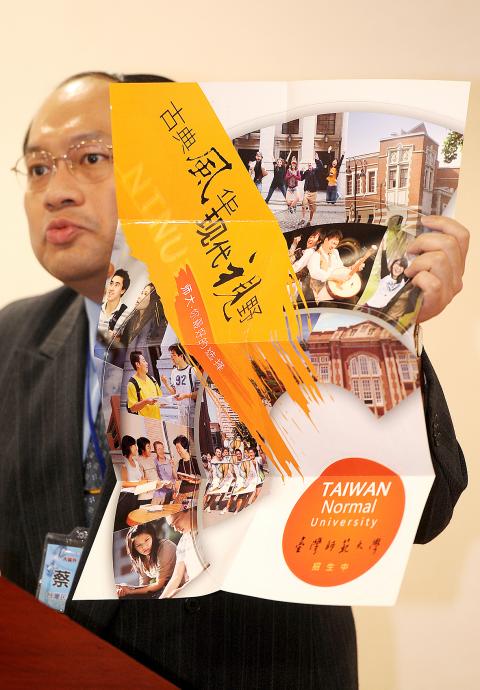A Taiwanese public university yesterday confirmed at a forum on cross-strait affairs that it had changed its name in an effort to attract more Chinese students, while a Chinese academic dared Taiwan to join an “experiment in democracy” in China.
National Taiwan Normal University (NTNU) has made extensive efforts to attract Chinese students, who will be allowed to enroll starting in September, NTNU professor Tsai Chang-yen (蔡昌言) said at the Cross-Strait Competitiveness Forum organized by the National Competitiveness Forum think tank.
In the school’s promotional posters and application brochures in simplified Chinese, the word “national” is not included in the school name, a move to demonstrate “goodwill” to China, Tsai said as he showed the poster to the audience.

Photo: Liu Hsin-de, Taipei Times
Speaking earlier, Mainland Affairs Council Deputy Minister Chao Chien-ming (趙建民) attributed what he called Taiwan’s loss of national competitiveness to the “mishandling of cross-strait relations,” without elaborating.
Chao accused former president Lee Teng-hui (李登輝) of “taking the nation in the wrong direction since the middle of the 1990s,” about the time when Lee put political identity above economic development and everything else.
Taiwan spent too much energy on “meaningless activities” during that period, Chao said.
Meanwhile, Li Minrong (李閩榕), director of the Development Research Center under the Fujian Provincial Government, raised eyebrows, when he said that political systems can be experimental, adding that a project could be launched in Pingtan, Fujian Province, to encourage bilateral cooperation on economic affairs.
“Since Taiwan has always been proud of its democratic system, China is open to a ‘political experiment’ at Pingtan Park. We [China] dare Taiwan to join the experiment,” Li said.
Democracies in the West and the East differ in form and character because of the difference in culture and background, Li added.
National Competitiveness Forum chief executive Hsieh Ming-hui (謝明輝) focused on a potential meeting between President Ma Ying-jeou (馬英九) and Chinese President Hu Jintao (胡錦濤).
“If re-elected in January, Ma is expected to accelerate cross-strait engagement in his second term to achieve a ‘breakthrough’ in bilateral relations,” Hsieh said.
With Hu scheduled to leave office in November next year, “the best time for the two leaders to meet falls between Taiwan’s presidential election and Hu’s departure,” Hsieh said.
The Ma-Hu meeting would be a new start for cross-strait relations and a catalyst for ensuing developments, such as a peace accord or a military confidence-building mechanism, he said.
Meanwhile, in a surprise move, Wang Teng-kun (王騰坤), an assistant professor at National Chung Cheng University and deputy director of the Chinese Nationalist Party’s (KMT) youth department, challenged Straits Exchange Foundation Vice Chairman Kao Koong-lian (高孔廉) over his presentation earlier at the conference.
Kao’s briefing on cross-strait relations, Wang said, failed to mention how much Taiwan’s agricultural sector had suffered since the Economic Cooperation Framework Agreement (ECFA) came into force.
In a brief response, Kao brushed off the criticism.

Taiwan is to commence mass production of the Tien Kung (天弓, “Sky Bow”) III, IV and V missiles by the second quarter of this year if the legislature approves the government’s NT$1.25 trillion (US$39.78 billion) special defense budget, an official said yesterday. Commenting on condition of anonymity, a defense official with knowledge of the matter said that the advanced systems are expected to provide crucial capabilities against ballistic and cruise missiles for the proposed “T-Dome,” an advanced, multi-layered air defense network. The Tien Kung III is an air defense missile with a maximum interception altitude of 35km. The Tien Kung IV and V

The disruption of 941 flights in and out of Taiwan due to China’s large-scale military exercises was no accident, but rather the result of a “quasi-blockade” used to simulate creating the air and sea routes needed for an amphibious landing, a military expert said. The disruptions occurred on Tuesday and lasted about 10 hours as China conducted live-fire drills in the Taiwan Strait. The Civil Aviation Administration (CAA) said the exercises affected 857 international flights and 84 domestic flights, affecting more than 100,000 travelers. Su Tzu-yun (蘇紫雲), a research fellow at the government-sponsored Institute for National Defense and Security Research, said the air

Taiwan lacks effective and cost-efficient armaments to intercept rockets, making the planned “T-Dome” interception system necessary, two experts said on Tuesday. The concerns were raised after China’s military fired two waves of rockets during live-fire drills around Taiwan on Tuesday, part of two-day exercises code-named “Justice Mission 2025.” The first wave involved 17 rockets launched at 9am from Pingtan in China’s Fujian Province, according to Lieutenant General Hsieh Jih-sheng (謝日升) of the Office of the Deputy Chief of the General Staff for Intelligence at the Ministry of National Defense. Those rockets landed 70 nautical miles (129.6km) northeast of Keelung without flying over Taiwan,

A strong continental cold air mass is to bring pollutants to Taiwan from tomorrow, the Ministry of Environment said today, as it issued an “orange” air quality alert for most of the country. All of Taiwan except for Hualien and Taitung counties is to be under an “orange” air quality alert tomorrow, indicating air quality that is unhealthy for sensitive groups. In China, areas from Shandong to Shanghai have been enveloped in haze since Saturday, the ministry said in a news release. Yesterday, hourly concentrations of PM2.5 in these areas ranged from 65 to 160 micrograms per cubic meter (mg/m³), and pollutants were